|
New Jersey State Archives
225 West State Street-Level 2
P.O. Box 307
Trenton, NJ 08625-0307
Contact Information
Email: Feedback@sos.state.nj.us |


| |
|
In 2009, two centuries after Abraham Lincoln’s birth, New Jerseyans generally recognize him as one of the nation’s greatest presidents. Lincoln’s legacy as a wartime leader, preserver of the Union, and emancipator of the slaves, his gift for inspirational oration, and his tragic assassination make him easily one of the most venerated of presidents.
To observe the Lincoln bicentennial, New Jersey State Archives is pleased to present a selection of digitized documents and published sources relating to Lincoln’s election in 1860, his inaugural visit to Trenton in 1861, and his eventual return to the city in April 1865 aboard a funeral train that retraced the inaugural route back to Springfield, Illinois.
The State Archives thanks the New Jersey State Library for allowing their original newspapers to be scanned to complement manuscripts from the Archives’ collections. |
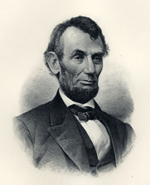
(click
to enlarge)
Abraham Lincoln lithographic print.
|
Election
of 1860
Inaugural
Visit - February 21, 1861
Assassination
and Funeral
|
Election of 1860
With its southern counties south of the Mason-Dixon line, New Jersey was both geographically and politically a border state as the presidential election of 1860 approached. Having many economic and social ties with the South, many New Jerseyans sympathized with the southern states on deeply divisive issues such as slavery and state’s rights. Lincoln thus lost the popular vote in the election, as the electorate favored Democrat Stephen A. Douglas and other minor party candidates. However, due to how New Jersey’s members of the Electoral College were selected, Lincoln won four of New Jersey’s seven electoral votes. |
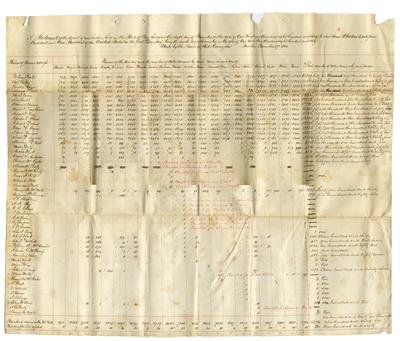
1860 Election Return
(click to enlarge)
|
New Jersey’s College of Electors met at the State House on December 7, 1860 to cast votes for the President and Vice President, with Joseph C. Hornblower presiding. Although Stephen Douglas and other candidates collectively outpolled Lincoln in the general election 62,000 votes to 58,300, Lincoln still won four electoral votes to Douglas’s three. The anomaly came about because Lincoln’s opponents failed to forge a “fusion ticket.” Douglas’s supporters reneged on a pledge to join such an alliance, forcing the electors for the minor party candidates to run against both Douglas’s and Lincoln’s electors. The split handed four New Jersey electoral votes to Abraham Lincoln.
None of this background information appears in the formal minutes of the Electoral College—only the outcome is mentioned. Below are the fourth, fifth, sixth and seventh pages of the minutes, which record the actual casting of electoral votes.
|
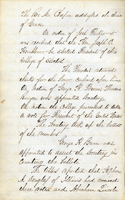
(click to enlarge)
|
|
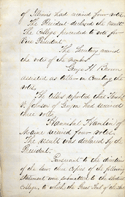
(click to enlarge)
|
|
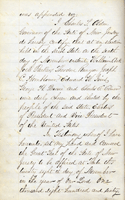 (click to enlarge) (click to enlarge)
|
|
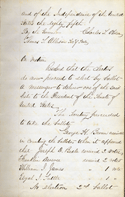
(click to enlarge)
|
| |
|
|
|
|
|
|
The contemporary Daily True American of Trenton leaned strongly toward the Democratic Party, and its reports reflected a clear bias against Abraham Lincoln in the 1860 presidential election. In a post-election column, “All Hail New Jersey!,” the newspaper’s editors lauded New Jersey’s electorate for casting the majority of the popular vote to Lincoln’s opponents. They wrote: “It is with no small amount of pride and satisfaction that we record the facts to be found in our table of returns of the electoral vote [sic; they meant popular vote], which, although not complete, show conclusively that the Rail-Splitter has been defeated in the State by a majority of about five thousand….” Later in the same article they wrote: “Whatever disasters may result to the country from the election of LINCOLN, which seems to be conceded on all hands, it will be a great consolation for the Democracy and Union men of this State to know, they are not responsible.” |
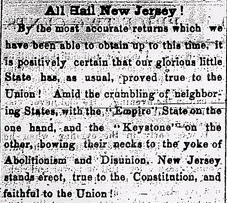
(click to enlarge)
Daily True American
November 8, 1860
|
| |
|
Inaugural Visit
Despite
New Jersey’s preference in the election, the State Legislature
asked Gov. Charles S. Olden to invite President-elect Lincoln to visit Trenton and the
State House during his train journey from Illinois to the
inauguration in Washington, D.C. Lincoln’s handwritten
acceptance letter of February 6, 1861 is one of the prized
documentary treasures in the New Jersey State Archives. With
many stops to make along the route, Lincoln’s closed
his letter with a postscript: “Please arrange no ceremonies
that will waste time.”
Plans
for Lincoln’s visit to Trenton and the State House were
described in the official records of both houses of the State
Legislature. Shown in the top row below are scanned images
of pages from the handwritten original version of the Senate
Journal for February 11, 1861. The Senate Secretary typically
pasted original correspondence and resolutions presented as
part of the business session directly on the rough journal’s
pages. Governor Olden's letter to the Legislature reporting
Lincoln's acceptance of the invitiation to visit the State
House and a resolution on the formation of a legislative presidential
preparation committee are below. The corresponding pages from
the printed, published version of the Senate Journal for the
same session that appear in the bottom right are more legible.
|
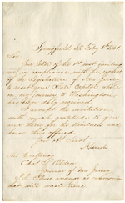
|
|
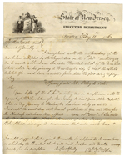 |
|
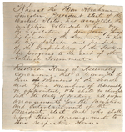 |
|
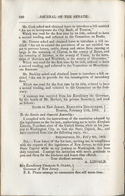 |
(click
to enlarge)
Lincoln
letter to Gov.
Charles S. Olden, 1861. |
|
(click
to enlarge)
Governor Olden letter to the Legislature. |
|
(click
to enlarge)
Committee formed
to prepare for
Lincoln’s visit. |
|
(click
to enlarge)
Printed Senate Journal (3 pages) February 11, 1861,
p. 180-182 |
| |
|
|
|
|
|
|
 |
In session the following day, the General Assembly received
the Senate’s newly adopted resolution calling for
a joint committee to prepare for Lincoln’s visit (above), along with their own copy of Governor Olden’s
letter reporting Lincoln’s acceptance of the invitation.
The top two rows of images below come from the handwritten
original version of the Assembly Minutes, which include
pasted-in correspondence and resolutions. Below are the
printed, published version of the Minutes that correspond
with the rough Minutes.
|
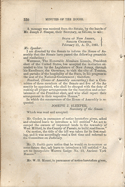
(click
to enlarge) |
|
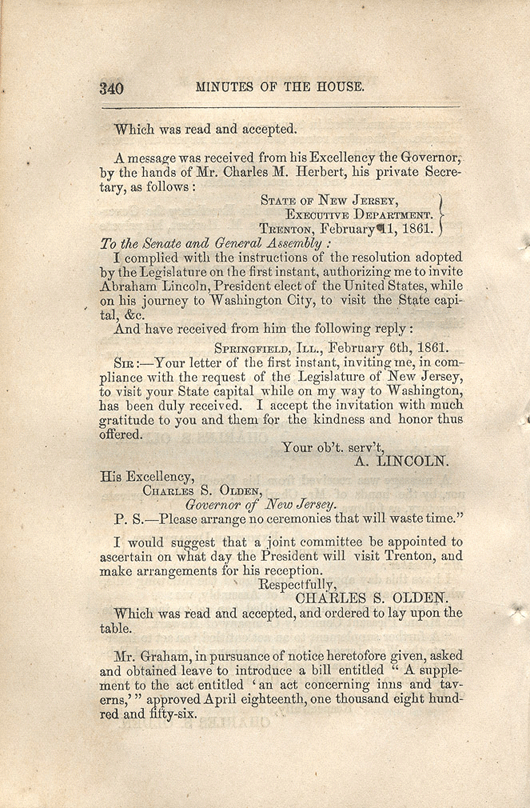
(click
to enlarge) |
|
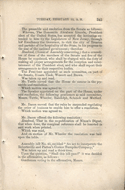
(click
to enlarge) |
Printed
Assembly Minutes, February 21, 1861, pg. 336, 340 and 345
|
The President-elect
arrived at the Trenton train station late on the morning of
February 21, 1861. As Lincoln made his way by carriage to
the State House, the Senate had already convened. In the handwritten
original Senate Journal for the session appear two different
resolutions admitting selected officials of the executive
and judicial branches (Secretary of State, Treasurer, Clerks
of Chancery and Supreme Court) into the Senate Chamber during
Lincoln’s visit. The second of these resolutions admits,
in addition, “committees in attendance from other cities”
(below left). On the day that Lincoln arrived there
were seventeen Senators present; four were absent that day
(below middle). Lincoln arrived at the Senate shortly
after noon. The account of his reception there and his brief
remarks to the upper house appear in the printed, published
Senate Journal (below right).
Senate
President Edmund Perry welcomed Lincoln and offered him good
wishes as he went “to preside over the destinies of
this vast country at a time of great distraction and imminent
peril….” Lincoln’s own remarks to the Senate
begin at the bottom of the page and continue on the next.
In Lincoln’s remarks he paid tribute to New Jersey’s
prominent role in the Revolution, and he recalled reading
of Washington’s struggles, of which “none fixed
itself on my mind so indelibly, as the crossing of the Delaware,
preceding the battle of Trenton.”
|
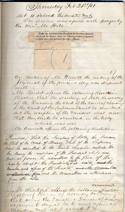 (click
to enlarge) |
|
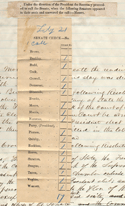 (click
to enlarge) |
|
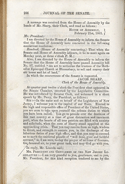
(click
to enlarge) |
Rough
Senate Journal, February 21, 1861 |
|
Rough
Senate Journal, February 21, 1861 |
|
Senate
Journal,
February 21, 1861
pg. 266-267 (2 pages)
|
The
General Assembly was also in session as Lincoln addressed
the Senate. Minutes prior to the President-elect’s arrival
in the Assembly Chamber, some members—evidently displeased
with Lincoln’s election—offered a series of unflattering
resolutions, the first three of which were tabled, and the
final one was ruled out of order by Speaker Frederick H. Teese.
When Lincoln entered the Chamber, however, he was treated
politely and respectfully, and according to a contemporary
news report, his remarks were received with enthusiasm. Lincoln’s
address to the Assembly was longer and more poignant than
his remarks to the Senate.
Unhappy
at the prospect of a Lincoln presidency, some Assembly members
offered resolutions “that when this meeting shall have
seen Abr[ah]am Lincoln they will have seen a man six feet
& 4 inches in height,” and “that when this
House shall have seen Abraham Lincoln they will have seen
the Ugliest man in the Country….” Both were tabled
. The lampooning continued with a resolution, also tabled,
“that we trust this Legislature may always have a Democratic
member that shall excede (sic) the President 2½ inches
in height” (below left). Seconds before Lincoln’s
arrival, a final resolution urged “that we all go for
Abe Lincoln.” Speaker Teese ruled the proposed physical
assault on Lincoln to be out of order.
The Assembly
Clerk did not record a complete handwritten account of Lincoln’s
appearance or his remarks, but simply pasted in a folded newspaper
account (below middle). Speaker
Teese welcomed Lincoln with introductory remarks, expressing
sympathy with the grave situation facing the new administration:
“Already have the dark clouds of disunion obscured a
portion of those states which lately shone in an undivided
constellation….” The Assembly responded supportively
to Lincoln’s own remarks. Asked “if I do my duty
and do right, you will sustain me, will you not?” the
House cheered loudly and cried “Yes! Yes! We will!”
|
|
|
|
|
|
(click
to enlarge)
|
|
(click
to enlarge) |
|
(click
to enlarge) |
|
Rough
Assembly Minutes |
|
Newspaper
pasted into Assembly rough minutes of Lincoln's Speech |
|
Printed
Assembly Minutes, February 21, 1861 (4 pages) |
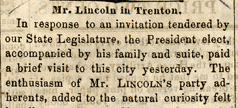 |
|
The
day after Lincoln’s visit to the State House, the newspaper
account of his appearance before the Senate and General Assembly
were recorded without bias. Other reports on the same page reflect
the anti-Republican sentiments of the editors. One article describes
Republicans who would use force to restore the seceded southern
states to the Union as “coercionists.” |
| (click
image to enlarge) |
|
|
Assassination and Funeral
In the
wake of Lincoln’s assassination on Friday, April 14,
1865, the Daily True American expressed the same shock and
outrage felt throughout the northern states. The True American’s
editions reported the passage of Lincoln’s funeral train
through Trenton on Monday, April 24, at 6:00 a.m.
|
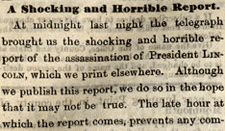
(click to view full page) |
|
April
15, 1865
On
the day after the President’s assassination, the True
American’s editors wrote in disbelief: “At midnight
last night the telegraph brought us the shocking and horrible
report of the assassination of President Lincoln, which we
print elsewhere. Although we publish this report, we do so
in the hope that it may not be true. The late hour at which
the report comes, prevents any comment other than the expression
of this hope, and of horror at such a brutal, cowardly and
detestable act.”
|
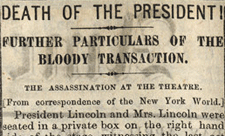
(click to view full page)
|
|
April
17, 1865
Two
days later, the newspaper was filled with editorials and reports
on the assassination. The editors acknowledge their political
differences with Lincoln, but credited the slain President
with ”private traits of character which would naturally
attract him while living the warm affection of many, while
they would occasion from all who knew him the sincerest sorrow
at his death.” |
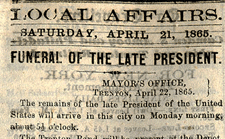
(click
to view full article)
|
|
April
21, 1865
Mayor
Franklin S. Mills’s proclamation announcing plans for
the city’s tribute to Lincoln as his funeral train passed
through Trenton appeared in the April 21, 1865 edition of
the True American. |
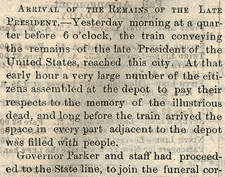
(click to view full article) |
|
April
25, 1865
The
newspaper included a detailed account of the Lincoln funeral
train’s slow procession though Trenton on Monday, April
24, 1865. The report mentions that “The pressure of
the crowd … was so excessive that those in the front
part of the [train] depot found it difficult to keep their
places, and many were deprived of the opportunity of seeing
the [funeral] car.” It concluded: “Considering
the very early hour, the number of citizens present and participating
in the obsequies, was remarkably large. No accident occurred,
and the solemn affair passed off with great credit to the
city.”
|
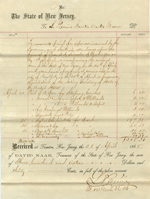 (click to view full article)
(click to view full article) |
|
|
|